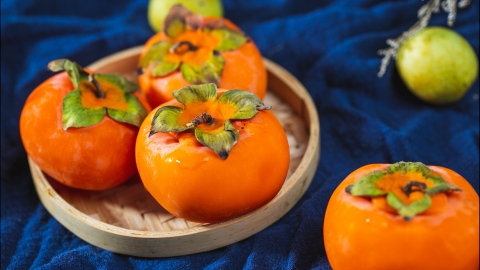What should not be eaten with persimmons?
Generally, persimmons should not be consumed with crabs, sweet potatoes, alcohol, kelp, goose meat, or other similar foods. They should also not be taken with medications such as compound aminophylline tablets, amoxicillin capsules, hydrochlorothiazide tablets, ferrous sulfate tablets, and compound aminophylline tablets. Details are as follows:

I. Foods
1. Crabs: Crabs are rich in protein, while persimmons contain large amounts of tannic acid. When protein meets tannic acid, they coagulate in the stomach, forming indigestible clumps that may cause abdominal pain, vomiting, diarrhea, and other symptoms. Additionally, both persimmons and crabs are cold-natured foods, and consuming them together may damage the spleen and stomach.
2. Sweet Potatoes: Fermentation products in sweet potatoes may react with tannins and cellulose in persimmons, forming precipitates in the stomach that affect normal gastric function. In severe cases, intestinal obstruction may occur.
3. Alcohol: Persimmons have an astringent effect, while alcohol has a spicy and slightly bitter taste and is hot in nature and toxic. Alcohol stimulates increased secretion in the intestines upon entering the stomach. When it encounters tannic acid in persimmons, it may form a viscous substance that combines with cellulose to form clumps, which are difficult to digest and expel, possibly causing intestinal obstruction.
4. Kelp: Kelp is rich in calcium ions, while persimmons contain considerable tannic acid. When calcium ions combine with tannic acid, they form insoluble complexes that affect digestion and absorption of nutrients and may cause gastrointestinal discomfort.
5. Goose Meat: Goose meat contains complete and high-quality protein. When this protein encounters tannic acid in persimmons, it may coagulate into tannic acid-protein complexes in the gastrointestinal tract, increasing the digestive burden and potentially causing physical discomfort in severe cases.
II. Medications
1. Calcium Carbonate Tablets (e.g., Ostocalcium): Tannic acid in persimmons can combine with calcium in the medication to form compounds that are difficult for the body to absorb, potentially forming stones in the body and affecting drug efficacy.
2. Amoxicillin Capsules: Certain components in persimmons may stimulate gastric acid secretion. When taken with this type of medication, it may affect drug absorption and efficacy. Excessive gastric acid secretion may reduce the absorption rate of the medication.
3. Hydrochlorothiazide Tablets: Certain components in persimmons might affect the body's absorption and utilization of this medication, potentially leading to hypotension, which poses a certain risk to patients with hypertension.
4. Ferrous Sulfate Tablets: Tannic acid in persimmons combines with iron ions in the medication to form compounds that are difficult to absorb, thus affecting the iron supplementation effect and reducing therapeutic efficacy.
5. Compound Aminophylline Tablets: Tannic acid in persimmons can bind with this medication, affecting its absorption and therapeutic effect. This drug is mainly used for treating asthma, and consuming it with persimmons may reduce its efficacy, affecting disease treatment.
Persimmons should not be eaten on an empty stomach either, because tannic acid in persimmons may combine with gastric acid to form bezoars, causing stomach pain and other symptoms.





